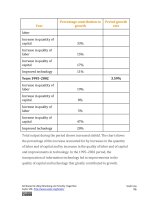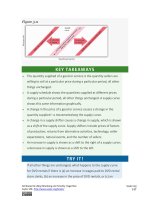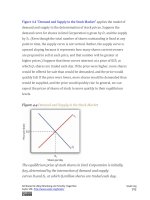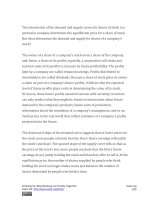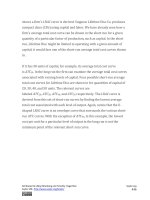Authors libby rittenberg 759
Bạn đang xem bản rút gọn của tài liệu. Xem và tải ngay bản đầy đủ của tài liệu tại đây (356.54 KB, 1 trang )
that higher minimum wages may reduce the welfare of low income
workers is that participation in the labor force by teenagers has been
shown to fall as a result of higher minimum wages. If the opportunity to
earn higher wages reduces the number of teenagers seeking those wages,
it may indicate that low-wage work has become less desirable.
In short, the possibility that higher minimum wages might not reduce
employment among low-wage workers does not necessarily mean that
higher minimum wages improve the welfare of low income workers.
Evidence that casts doubt on the proposition that higher minimum
wages reduce employment does not remove many economists’ doubt
that higher minimum wages would be a good policy.
Sources: Daniel Aaronson and Eric French, “Employment Effects of the
Minimum Wage,”Journal of Labor Economics, January 2007, 25(1),
167–200; David Card and Alan B. Krueger, “Minimum Wages and
Employment: A Case Study of the Fast-Food Industry in New Jersey and
Pennsylvania,” American Economic Review, 84 (1994): 772–93; Chris
Dillow, “Minimum Wage Myths,” Economic Affairs, 20(1) (March
2000): 47–52; Dwight R. Lee, “The Minimum Wage Can Harm Workers
by Reducing Unemployment,” Journal of Labor Research, 25(4) (Fall
2004); Andrew Leigh, “Employment Effects of Minimum Wages:
Evidence from a Quasi-Experiment,” The Australian Economic Review,
36 (2003): 361–73; Andrew Leigh, “Employment Effects of Minimum
Wages: Evidence from a Quasi-Experiment—Erratum,” The Australian
Economic Review, 37(1): 102–5; Alan Manning, “Monopsony and the
Efficiency of Labour Market Interventions,” Labour Economics, 11(2)
(April 2004): 145–63; Walter J. Wessels, “Does the Minimum Wage
Attributed to Libby Rittenberg and Timothy Tregarthen
Saylor URL: />
Saylor.org
759
